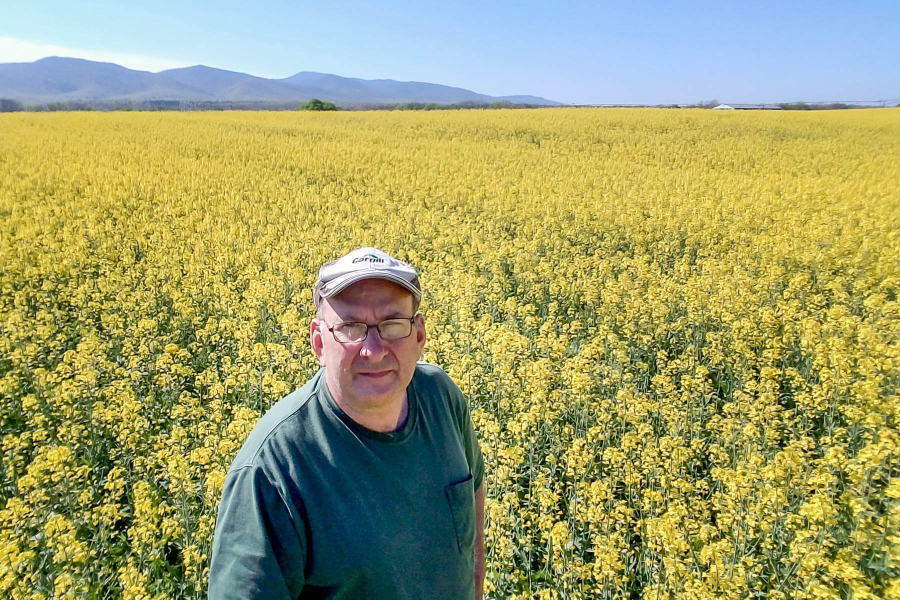Alternative energy powers a Virginia farm

The concept of generating enough energy to power his 850-acre farm always fascinated Glen Rodes. Since the early 2000s, Rodes has experimented with alternative energy sources, including burning corn, wood chips and turkey litter, in a desire to be more cost-efficient and embrace sustainable practices. Increasing the use of biofuels not only provides environmental benefits, like decreasing dependence on fossil fuels, but is also beneficial in other ways, such as supporting the local agricultural economy.
Experimenting with alternative energy
At Riverhill Farms, located in rural Port Republic, Virginia, Rodes raises turkeys, dairy cattle and beef cattle, while growing corn, grass, soybeans and canola. He first experimented with alternative fuel sources by purchasing a corn-burning boiler which generated enough heat to supplement the farm’s traditional propane system for the turkey houses.
Around 2010, he went a step further, creating biodiesel from the soybeans grown on the farm. After a few years, Rodes added oil-rich canola seed plants to his winter cover crops to further increase his source of fuel. The seeds are crushed and pressed, and the separated oil is processed into biodiesel at a cost of about $1 per gallon. The farm generates about 6,000 gallons of biodiesel annually that is used to power farm equipment like tractors and irrigation pumps.
Next, Rodes moved on to wood chips. In 2012, he purchased an LEI Bio-Burner 500, which burns wood chips to heat the water piped under the floor of the turkey barns to warm them. The 250,000 turkeys raised on the farm annually generate approximately 1,500 tons of poultry litter, so it was only natural to eventually add small amounts of poultry litter into the burner. The poultry company that Rodes works with provides a certain amount of funding to heat the barns, so any savings realized on energy costs goes back into the farm.

Currently, Rodes is experimenting with hemp seed oil, after becoming one of the first farmers in Virginia approved to grow hemp. He currently holds a commercial hemp license in the state and is working with James Madison University to research methods of using hemp for fibers and oils, including its application in biodiesel.
Rodes also recently created biochar, a carbon-rich product derived when biomass, such as poultry litter, is heated at a relatively low temperature in a closed container with little or no available air. He plans to use it to help reduce ammonia found in the poultry houses but notes that it can also be used as bioenergy, as a soil amendment or as a fertilizer.
Recognition for alternative energy efforts
Being an early adopter of biofuel technology brought national attention to Riverhill Farms. In 2010, the farm was chosen as a demonstration project for the Chesapeake Bay Farm Manure-to-Energy Initiative, which demonstrates and evaluates manure-based energy systems that operate on private farms within the Chesapeake Bay watershed.
Funding provided by the initiative allowed Rodes to upgrade his LEI Bio-Burner 500 in order to burn a larger percentage of poultry litter. It also allowed him to further experiment to see if emissions from particulate matter could be controlled, as well as modify how fuel and ash is handled throughout the process. The burner is exempt from regulation due to its size, but Rodes worked with the Virginia Cooperative Extension to ensure it's clean-burning. Currently, the burner is being upgraded with better technology that will continue to reduce particulate emissions.
Rodes is an ambassador for biofuels. He’s presented at agricultural conferences, in front of a state agricultural committee and at schools. He hosts farm visitation days for environmental officials, fellow farmers, international visitors and school groups to allow them to have a first-hand look at his operation in action. He’s mentored students on biofuel-related research projects, including his own two daughters. By spreading the word and sharing his experiences, Rodes hopes he might inspire others to give biofuels a chance.
In 2016, Riverhill Farms was awarded USPOULTRY’s Family Farm Environmental Excellence Award for its dedication to environmental stewardship.
Beyond environmental benefits
The floor-based, radiant heat source provided by the bio-burner creates a lower relative humidity environment that requires less ventilation then the original propane heating system, saving energy.
"We save 8,000 to 10,000 gallons of propane each year by burning biofuels to supplement the heat needed for our turkey houses," notes Rodes.
It also results in a drier poultry litter, which is better for burning and is lighter if transport is needed. Farms in the agricultural lands of the Shenandoah Valley typically generate more animal waste and associated nutrients than can be used onsite; therefore, animal waste such as turkey litter must be transported to other areas of the state to avoid contributing to nutrient pollution of local waterways. Fortunately, burning poultry litter reduces its volume and weight, which will lower transportation requirements and costs, making it easier to remove excess nutrients from the watershed.
Burning biofuels helps poultry thrive, helps the farm save money on fuel costs and allows the Rodes family to continue along the path toward energy self-sufficiency while also protecting the environment. It’s a win-win.
Lessons learned
Although Rodes has enjoyed much success with his alternative energy projects, some projects have not worked out as well as anticipated. He remains undaunted.
“Just because a project fails or doesn’t perform as hoped at the start, you still win,” he explains. “You learn from it and develop ideas for how you might improve on the project or take it in a different direction. I’m always looking for new avenues to explore."
Read our fact sheet about this project to learn more.
Credit for this article goes to Kary Phillips, Tetra Tech.

Comments
There are no comments.
Thank you!
Your comment has been received. Before it can be published, the comment will be reviewed by our team to ensure it adheres with our rules of engagement.
Back to recent stories